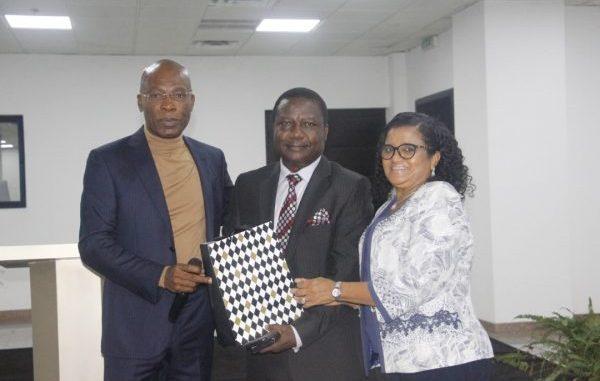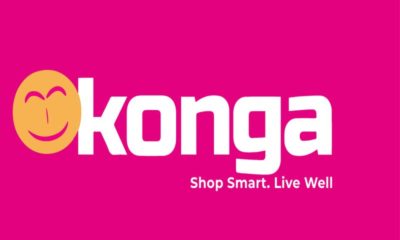Serial digital entrepreneur and Chairman, Zinox Group, Leo Stan Ekeh have heaped praises on two recently retired Executive Management staff, Chairman of Konga Group, Mr. Olusiji Ijogun and Executive Director, Zinox Group, Mr. Etiene Etukudoh for their immense contributions and years of outstanding service to the companies, even as he expressed deep gratitude to them for their invaluable efforts and sacrifices.
Ekeh spoke at a smart valedictory event held in honour of Ijogun and Etukudoh.
The event was held at the impressive Yudala Heights located at Idowu Martins, Victoria Island, Lagos on Tuesday, August 3, 2021. The well-attended event, organized in strict compliance with COVID-19 regulations, saw Executive Management and staff of the Zinox and Konga groups, as well as other guests and associates of the departing staff in attendance.
While delivering his appreciation speech, Ekeh explained his many years of a fruitful relationship with the two distinguished personalities and wished them greater heights in their future endeavours.
Ekeh, who described Ijogun as a brother, stated that integrity is a major quality for the choice of Chairman for any organization.
“For a company to be successful, the biggest brain is the Chairman and the CEO as they prescribe and supervise the implementation of quality culture, structure and systems. It is not just the knowledge of the business, the integrity of the personality and the quality of leadership. The business is bound to fail if the leaders don’t believe in God and that’s a major problem with start-ups in Africa. Konga wouldn’t have survived if I hadn’t known Siji.
‘‘It is a privilege to have Mr. Ijogun as Chairman of the Konga Group and we really appreciate his many efforts,” Ekeh said.
Further, Ekeh drew rich illustrations from his many professional and personal experiences with Mr. Ijogun, noting that his time as Chairman of the Konga Group was a blessing to the entity.
Also speaking about Etukudoh, who spent many performance-filled years at TD Africa where he rose to the position of Managing Director, Ekeh described him as an ideas man who he can always vouch for.
“Etiene is an all-rounder. He worked for all the companies in the Group. He is a good Nigerian and he has style. He’s one young man I can vouch for. He’s brilliant, modern and trustworthy. I have great confidence in him and I always told him when I have new businesses. He’s a man of great ideas and we consider it a privilege for him to have worked with us. This relationship is for life. You have me as a father so you can call me anytime,” Ekeh assured.
The event also offered attendees the opportunity to share their goodwill messages as well as their experiences of working with Ijogun and Etukudoh. Many of the speakers were effusive in hailing both men as inspirational professionals who will be greatly missed.
Reacting to the showers of encomiums, Ijogun, a certified corporate guru with a track record of exceptional service with a host of multinationals, expressed gratitude for the opportunity to serve as the first Chairman of the Konga Group after its acquisition by Zinox. He described Ekeh as a calculated risk-taker and an unmatched incubator of businesses that can turn a profit from waste.
He also predicted a progressive future for Konga and charged the Group to remain resilient by sustaining its impressive growth trajectory.
“Konga’s growth is phenomenal. Nobody knew online platforms would be the order of the day before COVID-19. To the glory of God, Konga has moved from loss-making to profit-making, with over 15 times greater in terms of revenue and I must commend Mr. Ekeh for the deep pockets. Since inception, we’ve added the Health, Food, Bulk and Travel business and still have more in the offing. With the influx of investors, Konga will be a major African business initiative in the nearest future,” Ijogun declared.
Also expressing gratitude for the memorable show of love, Etukudohreaffirmed his loyalty as a brand ambassador for the Zinox Group.
“I am grateful for the honour. In everything, I just wanted a big brand. I want to celebrate everyone who has been a part of my life. It’s been a journey. I came into the Group and made up my mind to demystify what people call the ‘Oga status’.
‘‘After today, nobody remembers the title but how you treated them. I’ll recommend that every staff work closely with the Chairman for at least one year before they leave the company. Chairman has been a big brother and his hunger has no part two. I’m grateful to Chairman, his wife, Mrs. Chioma Ekeh and everyone else. This is a great family and we have to keep it growing forever,” he said.


 Naira4 weeks ago
Naira4 weeks ago
 Naira4 weeks ago
Naira4 weeks ago


 Naira4 weeks ago
Naira4 weeks ago




 Naira3 weeks ago
Naira3 weeks ago
 Commodities4 weeks ago
Commodities4 weeks ago


 News4 weeks ago
News4 weeks ago


 Banking Sector4 weeks ago
Banking Sector4 weeks ago
 Travel4 weeks ago
Travel4 weeks ago

















